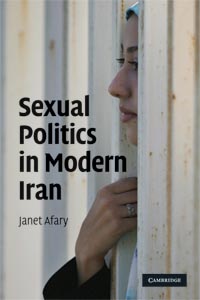With calls for inquiry over Iran’s election results, The New York Review of Books looks at 3 books that examine divisions in Iran, among them, Janet Afary’s Sexual Politics in Modern Iran.
~ ~ ~
The East–West battle over gender is brilliantly described by Janet Afary in her groundbreaking survey Sexual Politics in Modern Iran. As in other patrilineal societies the woman is the “door of entry to the group.” Improper behavior on her part can expose her community and family to all sorts of hidden dangers. Systems such as these
exercise a double standard wherein a woman’s infidelity (but not a man’s) is seen to allow tangible and damaging impurities to infiltrate the family, both physically and morally…. A woman’s sexual and reproductive functions turned her body into a contested site of potential and real ritual contamination. The concept of namus (honor) and the need to control women’s chastity may be related to this fear of sexual contamination.
 The sexual double standard was effectively institutionalized in all the mainstream Islamic traditions: men were permitted up to four legal wives and the right of divorce by repudiation (talaq). However, in pre-modern Iran (prior to the 1920s) male prerogatives were enhanced by the practice of temporary marriage (sigheh), which was exclusive to Shiism, and by the availability of concubines, which persisted after the formal abolition of slavery at the end of the nineteenth century. Sigheh was a sexual charter for men: the ease with which it was contracted meant that consensual affairs between men (married or unmarried) and single women could hardly ever be labeled fornication, and therefore subject to Islamic penalties.
The sexual double standard was effectively institutionalized in all the mainstream Islamic traditions: men were permitted up to four legal wives and the right of divorce by repudiation (talaq). However, in pre-modern Iran (prior to the 1920s) male prerogatives were enhanced by the practice of temporary marriage (sigheh), which was exclusive to Shiism, and by the availability of concubines, which persisted after the formal abolition of slavery at the end of the nineteenth century. Sigheh was a sexual charter for men: the ease with which it was contracted meant that consensual affairs between men (married or unmarried) and single women could hardly ever be labeled fornication, and therefore subject to Islamic penalties.
Gender segregation—common to most Islamic societies—contributed to the prevalence of other practices that are rarely discussed in social histories of Islam: boy concubinage and pedophilia. Although liwat or lavat (sodomy) is condemned in the Quran (the word alludes to the Old Testament story of Lot), homosexual relationships between older men and boys were tolerated, not least because they posed a lesser threat to the patriarchal order than unregulated heterosexual interactions.
Afary’s book exposes the absurdity of claims by ideologues such as Ali Akbar Natiq-Nuri, a former Iranian minister of the interior and presidential candidate, who blame the West for “spreading corruption and obscenity, propagating debauchery and homosexuality.” She provides plenty of evidence to show that the prohibition against liwat was honored in the breach. Beardless boys, not yet being men, could be “penetrated without losing their essential manliness, so long as they did not register pleasure in the act, which would suggest a pathology liable to continue into adulthood.” In a society where beards were de rigueur, the beardless European male was often thought to be an amrad (catamite). Institutionalized pederasty was part of a wider culture in which family security balanced or compensated for the turbulence prevailing in the public domain.
Latest Comments
Have your say!